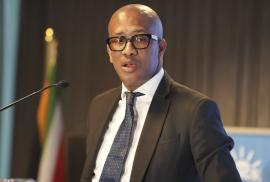
Deputy Minister in the Presidency, Kenny Morolong, has encouraged the youth to actively influence public policy decisions.
“As the youth, you should not just be passive recipients of public policy decisions; instead, you should and are actively influencing them, either directly through political participation or indirectly through civil society activism,” Morolong said.
He was speaking at the BRICS (Brazil, Russia, India, China and South Africa) Youth Summit in Durban on Thursday.
Addressing the summit, Morolong said youth activism was a necessary pressure point that led governments to elaborate on policies that prioritise education, job creation, climate change, and social justice - issues he said “resonate with the broad section of our youth populace”.
Challenges of unemployment, including inadequate educational opportunities and social inequalities, are some of the pressing issues that define youth experience, especially in South Africa and Africa as a whole.
While the youth are digitally connected, Morolong said, there was an increasing danger of information overload and a spread of misinformation.
“I hope that this summit has had time to address these issues to provide governments with a policy platform fully to harness the potential dividends for the youth and frustrate its negative impact.
“On a global scale, you have the possibility to significantly impact the geopolitical landscape through the kind of actions you take; issuing out of the policy platforms on which you may have agreed.
“As the BRICS youth, you have to insist on contributing to the digital economic policy that drives more inclusion and cooperation, to enable you fully to participate in global competition.
“Your innovation and entrepreneurial spirit presents an opportunity for the creation of a south-south supply chain that could strengthen the BRICS nations' position in the global digital landscape,” Morolong said.
Beacon of hope
Morolong highlighted that BRICS is gaining more and more global significance, as a beacon of hope in the global South.
He said the countries’ combined economic influence can play an important role in leading the global south towards a new era of finance and debt relief, focusing on sustainable growth, innovative financial mechanisms, and debt relief.
The Deputy Minister argued that sustainable growth is underpinned by not only economic expansion, but also by environmental preservation and social progress.
By focusing on inclusive growth, BRICS can help reduce inequality within and between nations, thus creating a more balanced global financial structure.
“Significantly, what are the innovative financial instruments that can significantly reshape the financial landscape and secure youth participation on a grand scale? How can the youth of the BRICS countries and the global South more broadly benefit from the financing that emanates from the New Development Bank (BRICS Bank)?
“The New Development Bank is a significant step towards providing an alternative source of funding for development projects for BRICS and other emerging economies. Enhanced financial cooperation between BRICS and countries of the global South can foster a more equitable financial order,” Morolong said.
He said that through bilateral or multilateral trade agreements, currency swap arrangements and collaborative investment projects, BRICS can help create a financial environment that supports the growth and stability of the global South.
In this regard, BRICS can help strengthen the economic resilience of the global South by sharing best practices in areas like financial regulation and fiscal management.
“As the world grapples with the economic effects of global challenges such as the COVID-19 pandemic and climate change, the role of BRICS could be more critical than ever in building a more equitable and resilient global financial system,” the Deputy Minister said. – SAnews.gov.za


